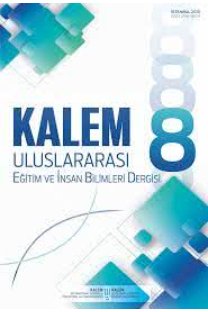UNESCO ve Dünya Bankası Küresel Eğitim Politikaları: Bir Karşılaştırma Çalışması
Global Education Policies of UNESCO and The World Bank: A Comparison Study
___
- Barrett, M. A. (2011). A Millennium learning goal for education post-2015: a question of outcomes or processes. Comparative Education, 47(1), 119-133. Deacon, B. (2007). Global social policy and governance. London: Sage.
- Doyal L. and Gough, I. (1991). A theory of human needs. Critical Social Policy, 4, 6-38.
- Godolphin, Z. (2011). World Bank as a global education ministry? Critical Voices on the World Bank and IMF, London: Bretton Woods Project. www.brettonwoodsproject.org/2011/01/ art-567384
- Hasan, A. and Hartog, J. (2010). How do development paradigms influence education policy? Journal of Educational Change, 11, 297-306.
- Heyneman, S. P. (2003). The history and problems in the making of education policy at the World Bank 1960-2000. International Journal of Educational Development, 23, 315-337.
- Kikeri, S. and Burman, A. (2007). Privatisation trends, public policy for the private sector, February 2007: Note Number 314, The World Bank Group.
- Klees, S. (2012), "World Bank and Education: Ideological Premises and Ideological Conclusions", Collins, C. and Wiseman, A. (Ed.) Education Strategy in the Developing World: Revising the World Bank's Education Policy (International Perspectives on Education and Society, Vol. 16), Emerald Group Publishing Limited, Bingley, pp. 151-171. Doi: 10.1108/S1479
- Osley, A. and Vincent, K. (2002). Citizenship and the challenge of global education. Oakhill: Trentham.
- Pritchett, L. (1996). Where has all the education gone? Policy Research Working Paper 1581, Washington: World Bank Policy Research Department.
- Rizvi, F. and Lingard, B. (2010). Globalizing education policy. Routledge: Oxon.
- SABER, (2011). Strengthening education quality in East Asia, 2011 East Asia Regional Conference, the World Bank.
- Steer, L. and Wathne, C. (2009). Achieving universal basic education: constraints and opportunities in donor financing (Draft for Consultation). Financing Universal Basic Education: Where Are We, What Next?
- Suárez-Orozco, M. M., and Qin-Hilliard, D. B. (2004). Globalization: Culture and education in the new millenium. Berkeley, CA: University of California Press.
- The World Bank. (2010). Education Topics, Retrieved from http://web.worldbank.org/WBSITE/EXTERNAL/TOPICS/EXTEDUCATIO N/0,,contentMDK:20264784~menuPK:534289~pagePK:210058~piPK:2100 62~theSitePK:282386,00.html.
- The World Bank. (2011). Learning for All investing in people's knowledge and skills to promote development. Washington: World Bank.
- The World Bank. (2012). World Bank education sector strategy 2020: learning for all strengthening education systems to improve learning. http://siteresources.worldbank.org/EDUCATION/Resources/ESSU/463292- 1306181142935/WB_ES_ExectiveSummary_FINAL.pdf
- UNDP. (2011). Human development report 2011 sustainability and equity: a better future for all. New York: Palgrave Macmillan.
- UNESCO. (2007). A human rights-based approach to education for all. Paris: UNESCO.
- UNESCO. (2015). Education for all. Retrieved from https://unesdoc.unesco.org/ark:/48223/pf0000232205
- UNESCO. (2011b). The hidden crisis: armed conflict and education. Paris: UNESCO.
- UNESCO. (2012). World atlas of gender equality in education. Paris: UNESCO.
- UNESCO. (2012b). Education. Retrieved from http://www.unesco.org/new/en/.
- UNESCO. (2012c). Education themes. Retrieved from, http://www.unesco.org/new/en/education/themes/
- UNESCO. (2015). Incheon Declaration and SDG4 – Education 2030 Framework for Action. http://uis.unesco.org/sites/default/files/documents/education-2030-incheonframework-for-action-implementation-of-sdg4-2016-en_2.pdf
- ISSN: 2146-5606
- Yayın Aralığı: 2
- Başlangıç: 2011
- Yayıncı: Kalem Vakfı Okulları
Güzel Sanatlar Liselerinin Yönetsel Sorunları Bulguların Karşılaştırmalı Analizi (2006-2016)
Serpil UMUZDAŞ, Ahmet Serkan ECE
Öğrencilerin, Aileden Edindikleri Tarih Bilgisine Yönelik Düşünceleri (Amasya Örneği)
Ramazan KAYA, Hasan GÜNAL, Derya EKİZ GÜNAL
Üniversite Eğitiminde Sosyal Medyanın Rolü: Fırsatlar ve Çıkmazlar
Okul Öncesi Dönem Üstün Yetenekli Çocukların Eğitimlerine Yönelik Kullanılan Öğretim Stratejileri
Yasemin AYDOĞAN, Şermin METİN, Zerrin MERCAN
Sosyal Bilgiler Öğretmen Adaylarının Politik Okuryazarlık Düzeyleri
Eğitim Fakültesi Öğrencilerinin Deneyimledikleri Sosyal Ağ Diyetiyle İlgili Görüşleri
48-72 Aylık Çocuklara Yönelik Denham Duygu Anlama Testinin Geçerlik Güvenirlik Çalışması
Elif YILMAZ, Kezban TEPELİ, Gülçin GÜVEN
Emine AKKAŞ BAYSAL , Gürbüz OCAK
UNESCO ve Dünya Bankası Küresel Eğitim Politikaları: Bir Karşılaştırma Çalışması
Modernleşme Sürecinde Toplumsal Bilincin Dönüşümü ve Eğitim Yönetimine Yansımaları
